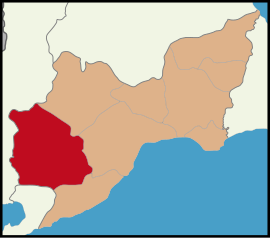|
Malkara
Malkara (Greek: Μάλγαρα, Malgara) is a municipality and district of Tekirdağ Province, Turkey.[2] Its area is 1,243 km2 (the largest in Tekirdağ Province),[3] and its population is 50,988 (2022).[1] It is located at 55 km west of Tekirdağ and 190 km from Istanbul. The mayor is Nergiz Karaağaçlı Öztürk (CHP). ClimateMalkara experiences a hot-summer Mediterranean climate (Köppen: Csa),[4] with hot, dry summers, and chilly, rainy, somewhat snowy winters.[5]
HistoryThrace was the scene of fighting during the Persian Wars and the name Malkara is said to come from the Persian 'Margaar' meaning 'cave of snakes'. Alternatively the town may be named after 'Malgar' a general in the army of Alexander the Great who built a fortress here after they had succeeded in bringing to an end the Persian 30-year occupation of Thrace. These fortifications remained in use up until the Byzantine period. Once the area had been brought under Ottoman control it was settled with Turks from Anatolia and a Turkish town emerged which thrived supplying the Ottoman cavalry regiments. Malkara was then used as a place of exile for those out of favor in the Ottoman court including:
The 17th-century Ottoman traveler Evliya Çelebi described Malkara as a tidy, hard-working town of 150 houses of tiled roofs noted for production of honey, cheese, and leather. At the end of the 18th century Malkara was the scene of an uprising by the Janissary troops in protest against plans by Sultan Selim III to replace them with a new model army. Malkara was occupied by Russian troops in the Russo-Turkish War of 1828-1829, again by the Russians in The Russo-Turkish War of 1877–1878 and most painfully by the Bulgarians for 8.5 months during the Balkan Wars of 1912–1913. In the aftermath of the 1913 Ottoman coup d'état, Malkara was reoccupied by Ottoman troops. During World War II, the Greek part of Thrace was occupied by German and Bulgarian troops, and when Turkey was preparing for a possible entry into the war against the Axis powers, refugees from Greece were briefly housed in Malkara for their safety. Malkara todayMalkara is a small market town serving the countryside around it, which is mostly devoted to growing sunflowers for seeds and oil.[citation needed] There are also one or two coal mines.[citation needed] Many of the people of Malkara originate in the Balkans[citation needed] and are liberal- and secular-minded.[citation needed] CompositionThere are 77 neighbourhoods in Malkara District:[7]
Places of interestThe village of Yenidibek with its reservoir and ruined Byzantine castle is a popular picnic spot. Notable people
References
|
||||||||||||||||||||||||||||||||||||||||||||||||||||||||||||||||||||||||||||||||||||||||||||||||||||||||||||||||||||||||||||||||||||||||||||||||||||||||||||||||




